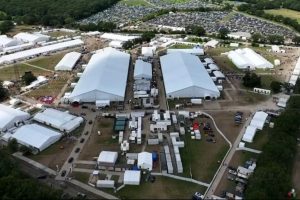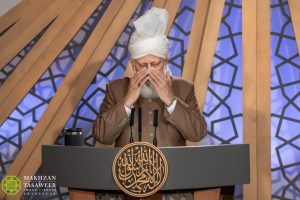
After reciting the Tashahhud, Ta‘awwuz, and Surah Al-Fatihah, Hazrat Khalifatul Masih V (aba) said that he would be making mention a few members of the community who had passed away recently.
His Holiness (aba) said that they all came from different backgrounds and had different levels of education but they all had one thing in common; they fulfilled their oath of giving precedence to their faith over worldly matters, fulfilled their pledge of bai’at (allegiance to the Promised Messiah (as)), and showed true loyalty to Khilafat. They served humanity and through their personalities showed the true beautiful teachings of Islam. In fact these were all things which they had in common.
His Holiness (aba) said that by hearing their accounts, faith becomes firm in the fact that it is truly in joining the Promised Messiah (as) that a true connection between man and God can be made, establishing firm faith in the existence of a living God.
Zulfiqar Ahmad Sahib
The first person His Holiness (aba) made mention of was respected Zulfiqar Ahmad Sahib, a missionary from Indonesia who passed away on April 21, 2020 at the age of 42 years. He served as a missionary in various regions for 18 years. He left behind a wife, and four children.
His Holiness (aba) said that he was a very successful missionary. He was very kind and friendly with every person he met. He never made any demands, rather he would say that one should focus on prayers. His Holiness (aba) commented that this is the true spirit of a life devotee, that if they need something, they should not make demands but should pray for it instead. Many people accepted Ahmadiyyat due to his Tabligh (preaching) efforts. Even when he was ill, he always gave precedence to the Jama’at work. He also travelled by ship to establish connections with ‘lost generations’ living on small islands. Due to these efforts, four families accepted Ahmadiyyat. He said that as long as he was living, he would endeavour to take part in all programs and work of the community. His Holiness said that this is the true spirit of a life devotee, rather than complaining about the slightest of discomforts. He had an ardent desire to visit Qadian, which God Almighty fulfilled this year. He was extremely humble; even though he would be the senior present, he did not hesitate to consult with those who were younger than him. He always said, do not despair, for our work is to merely sow the seed through propagation, perhaps someone else will come later to help these seeds grow. He beautifully fulfilled his oath of life devotion.
Dr. Pir Muhammad Naqiuddin Sahib
The second person His Holiness (aba) mentioned was Dr Pir Muhammad Naqiuddin Sahib of Islamabad, Pakistan who passed away on April 18, 2020 at the age of 74 years due to complications from the Coronavirus. He left behind a wife, a son and four daughters. His family both from the paternal and maternal sides were descendants of the companions of the Promised Messiah (as). He had a very successful medical clinic for the past 25 to 30 years.
His Holiness (aba) mentioned that he was a Qazi (judge) for the past twelve years who always based his decisions on Qur’an and Hadith, and all parties would be satisfied with the decisions he made. He was very kind and welcoming to everyone. His life was spent in serving humanity; the doors to his clinic were always open to the poor and needy, whether they belonged to the community or not. He would narrate the incident of when he passed his MBBS exam, and went to his grandfather Pir Mazharul Haq sahib. His grandfather advised him that along with the medicines he will prescribe to his patients, he should also ensure to pray for them as well, as advised by the Promised Messiah (as). Dr. Naqi said that he was a doctor for 50 years and acted upon this advice every single day, even offering two nafl (supererogatory prayers) daily for his patients. His Holiness (aba) said that this practice should be adopted by all doctors; that rather than only relying on their own efforts they should also pray for their patients as well. Dr. Naqi also had the honour of helping many people accept Ahmadiyyat through his efforts.
His Holiness (aba) mentioned that Dr. Naqi had a deep connection with God. Once he was staying overnight at his daughter’s home, who did not yet have any children, and doctors did not have much hope. But one morning at the time of prayer, he saw a vision in which a child seemed to almost fall off the bed, upon which he bent down so as to pick him up. Only a short while after seeing this vision, his daughter was blessed with a child. He also saw another vision regarding the live transmission of the Friday Sermon of the Khalifa, which he said we seen being fulfilled every single week through MTA.
His Holiness (aba) said that even when this virus spread, he did not stop going to the clinic, despite the fact that his family would advise against it. He would say that if the doctor stays at home, then what will become of the patients? As doctors, they were on duty and are to serve, not to make profit. Even during his illness, he still continued going to the clinic to tend to his patients. He had a deep knowledge of the Qur’an. Whenever there was a matter to be discussed, he always referred to the Qur’an first, presenting verses with their translation.
His Holiness (aba) said that Dr. Naqi had a special zeal for calling people unto God. He would invite people to his home on the last day of Jalsa Salana UK, so that they may observe the international Bai’at (initiation) ceremony. He would treat them as the guests of the Promised Messiah (as) and would treat them with great hospitality. He was not drawn to worldly allures, but was more interested in matters of religion and faith. He would say that it is no great matter to treat those who are kind to you with kindness, rather true morality is shown when one is kind to those who are unkind to you. His Holiness (aba) commented that this indeed is a reflection of the teachings of Islam.
His Holiness (aba) said that more than 50% of the patients he saw on a daily basis would be seen free of charge. He would always be worried about the well-being of the poor, and even undertook the responsibility of providing monthly rations for several families. When others would ask him for a sign for the truthfulness of the Promised Messiah (as), he would say that he himself was a sign, and through his own being and high level of morality he would have an awe inspiring effect. His Holiness (aba) said that this is a sign of a true believer; one who has a positive effect on those around him, thus serving as living sign for the truthfulness of the Promised Messiah (as).
His Holiness (aba) narrated an incident from the childhood of Dr. Naqi. Once his mother asked him if he had offered prayer. Since he was half asleep he replied that he had. Then in the middle of the night his mother came to him crying, saying that God had shown her in a vision that in fact he had not offered prayer. Dr. Naqi would say that since that day when he was just a child, he never slackened in offering his prayers.
Ghulam Mustafa Sahib
The third person His Holiness (aba) mentioned was respected Ghulam Mustafa Sahib of London, who was serving as volunteer in the Private Secretary’s office and passed away on April 25, 2020 at the age of 69 years due to complications from the Coronavirus. He left behind his wife, two daughters and a son.
His Holiness (aba) mentioned that Ghulam Mustafa Sahib accepted Ahmadiyyat at the time of the Third Caliph (rh). Though he was not a life devotee, he worked as if he was one. Despite not having a high level of education, God blessed him with great success. Though he was not a life devotee, he would always seek permission before going anywhere in relation to his business. When he first arrived in London, he lived in the mosque. He was offered a few jobs which he initially took. However, he thought that rather than doing these jobs it would be better to serve in the kitchen of the Promised Messiah (as) and so he left his job to work in the kitchen at Masjid Fazl in London.
His Holiness (aba) said that he was always at the forefront in matters of financial sacrifice and advised his family to do the same. When there would a be a call for financial sacrifices to be made, he would give whatever he had saved, even if it meant living under straitened circumstances himself. He was the only Ahmadi in his family and would pray never be financially dependent on anyone else in his family; he did not even take the inheritance left by his father. God heard his prayer and provided for him so much so, that it was Ghulam Mustafa Sahib who would be helping other members of his family. He would gather Tabarruk (items blessed by the Caliph) in his home so that he could distribute them amongst the guests of the Promised Messiah (as) who would stay with him at the time of Jalsa.
His Holiness (aba) said that he pledged that he would live wherever the Caliph was. His last advice to his younger daughter was to always remain attached to the Jama’at, offer prayers and recite the Qur’an, and thus all her matters would be taken care of. No matter the occasion, he never slackened in offering prayers. He advised his son, that no matter what he wanted in life, it is only God Who can provide it for him. Even in the days of his illness, he stood to offer prayers, and advised to always offer prayers in congregation. He always said that faith and the world must go forth hand in hand, but whenever a worldly matter comes up, the faith should be given precedence. Before going into a coma, his last words to his son were to make sure that his chanda (donations) had been paid in full and advised to always pay chanda on the first of every month.
His Holiness (aba) mentioned that he was very hospitable; he would bring a guest to his home almost every day, and during the days of Jalsa there were guests coming and going at all hours of the day. He had managed his business in such a way that he would never miss a prayer. It is said that he loved three things the most; Prayer, Khilafat and being hospitable. He accepted Ahmadiyyat after he saw a dream in which the Third Caliph (rh) said that he needed two young men and proceeded to point towards him. He was blessed to perform Umrah and Hajj. His doctor says that even in the final days of his illness, he was content with the Decree of God. When he was told that he may not recover from this illness, he showed no expression of sadness or grief, but rather expressed his contentment with the Will of God.
His Holiness (aba) prayed that may Allah elevate the station of all the deceased. May He reward them for the great devotion which they showed. These people are martyrs. May Allah keep their progenies in His protection and enable them to keep their good qualities alive.




Add Comment